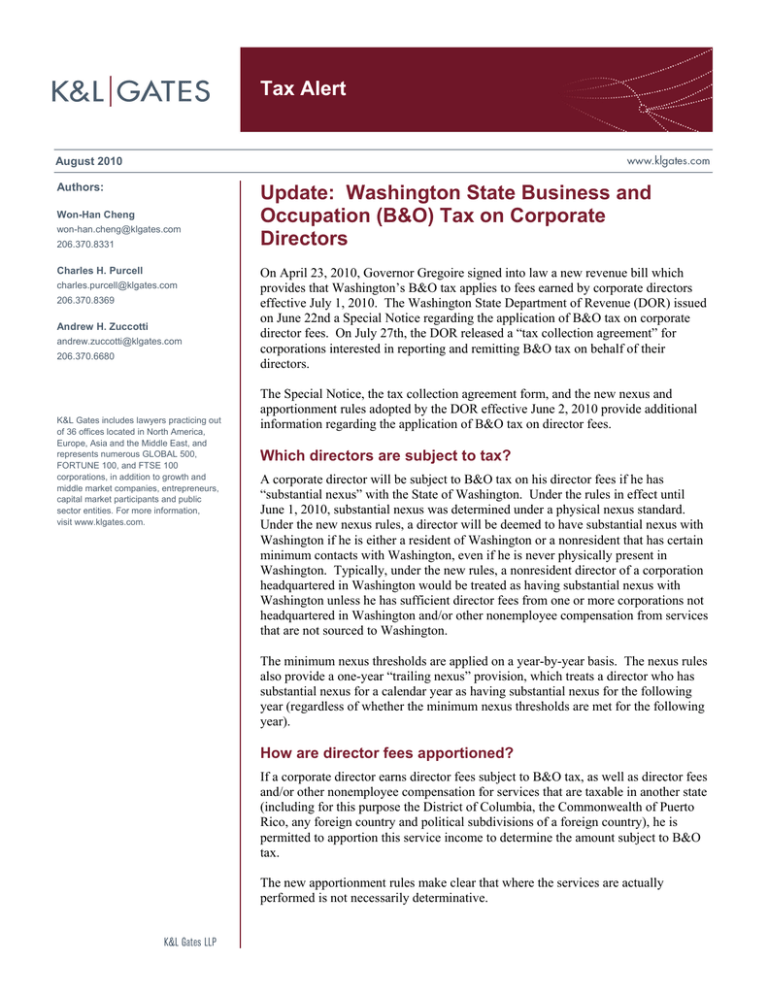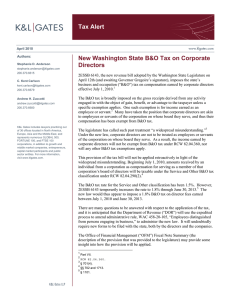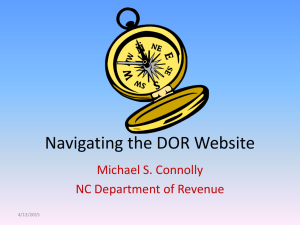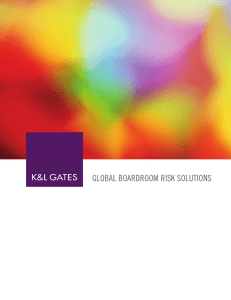
Tax Alert
August 2010
Authors:
Won-Han Cheng
won-han.cheng@klgates.com
206.370.8331
Charles H. Purcell
charles.purcell@klgates.com
206.370.8369
Andrew H. Zuccotti
andrew.zuccotti@klgates.com
206.370.6680
K&L Gates includes lawyers practicing out
of 36 offices located in North America,
Europe, Asia and the Middle East, and
represents numerous GLOBAL 500,
FORTUNE 100, and FTSE 100
corporations, in addition to growth and
middle market companies, entrepreneurs,
capital market participants and public
sector entities. For more information,
visit www.klgates.com.
Update: Washington State Business and
Occupation (B&O) Tax on Corporate
Directors
On April 23, 2010, Governor Gregoire signed into law a new revenue bill which
provides that Washington’s B&O tax applies to fees earned by corporate directors
effective July 1, 2010. The Washington State Department of Revenue (DOR) issued
on June 22nd a Special Notice regarding the application of B&O tax on corporate
director fees. On July 27th, the DOR released a “tax collection agreement” for
corporations interested in reporting and remitting B&O tax on behalf of their
directors.
The Special Notice, the tax collection agreement form, and the new nexus and
apportionment rules adopted by the DOR effective June 2, 2010 provide additional
information regarding the application of B&O tax on director fees.
Which directors are subject to tax?
A corporate director will be subject to B&O tax on his director fees if he has
“substantial nexus” with the State of Washington. Under the rules in effect until
June 1, 2010, substantial nexus was determined under a physical nexus standard.
Under the new nexus rules, a director will be deemed to have substantial nexus with
Washington if he is either a resident of Washington or a nonresident that has certain
minimum contacts with Washington, even if he is never physically present in
Washington. Typically, under the new rules, a nonresident director of a corporation
headquartered in Washington would be treated as having substantial nexus with
Washington unless he has sufficient director fees from one or more corporations not
headquartered in Washington and/or other nonemployee compensation from services
that are not sourced to Washington.
The minimum nexus thresholds are applied on a year-by-year basis. The nexus rules
also provide a one-year “trailing nexus” provision, which treats a director who has
substantial nexus for a calendar year as having substantial nexus for the following
year (regardless of whether the minimum nexus thresholds are met for the following
year).
How are director fees apportioned?
If a corporate director earns director fees subject to B&O tax, as well as director fees
and/or other nonemployee compensation for services that are taxable in another state
(including for this purpose the District of Columbia, the Commonwealth of Puerto
Rico, any foreign country and political subdivisions of a foreign country), he is
permitted to apportion this service income to determine the amount subject to B&O
tax.
The new apportionment rules make clear that where the services are actually
performed is not necessarily determinative.
Tax Alert
The DOR is currently working on a worksheet that is
intended to provide some additional guidance on
application of the new apportionment rules. This
worksheet has not yet been released.
will result in a 5% penalty on the tax due for any
period of time where a person engages in a taxable
activity and does not voluntarily register prior to
being contacted by the DOR.
What payments are subject to tax?
Most corporate directors with gross receipts of less
than $12,000 from all activities subject to B&O tax
are not required to register. In addition, where a
corporation agrees to report and remit B&O tax on
behalf of its corporate directors, its directors are not
required to register.
All compensation received (including
reimbursement for expenses), in whatever form, for
services rendered as a corporate director is subject to
B&O tax, without deduction for costs and expenses.
With respect to stock options, the Special Notice
provides that the value of the stock option is subject
to B&O tax in the year and in the amount reported
for federal income tax purposes on the IRS Form
1099 issued by the corporation to the corporate
director. A special exemption is provided for stock
options granted prior to July 1, 2010, even if the
income event for these stock options occurs after
July 1, 2010. The DOR has not yet provided
guidance with respect to restricted stock or other
nonoption equity compensation.
The B&O tax does not apply to compensation
received by employees except nonemployee director
fees received for services as a corporate director. In
addition, the B&O tax does not apply to fees
received by directors for serving on the boards of
limited liability companies.
What is the applicable tax rate?
The B&O tax rate for director fees will be 1.8%
through June 30, 2013. Beginning July 1, 2013, the
rate will decrease to 1.5%, absent future legislation.
The small business B&O tax credit may be available
to eliminate or reduce the amount of tax.
Based on the new law, it is possible that cities that
impose B&O taxes (such as Seattle and Bellevue)
may extend their B&O taxes to director fees,
possibly with retroactive effect.
Do corporate directors have to register
with the Secretary of State and the
DOR?
With a few exceptions, each corporate director
subject to B&O tax should register with the
Secretary of State and the DOR. The general
penalty provisions provide that failure to register
How should director fees be reported
and B&O tax paid?
Corporate directors should report their director fees
on the Combined Excise Tax Return under the
“service or other activities” B&O tax classification.
Tax returns generally will be due:
Frequency of
Filing
For Amount of Tax
(per year)
Monthly
Tax liability of more
than $4,800
Quarterly
Tax liability
between $1,050 and
$4,800
Annually
Tax liability of less
than $1,050
Applicable rules provide that persons registered
with the DOR must file tax returns and remit the
appropriate taxes unless placed on “active
nonreporting” status by the DOR. Under the new
law, the DOR may place a corporate director on
active nonreporting status if he has less than
$46,667 per year in total receipts from director fees
and other nonemployee compensation from services
sourced to Washington.
Can the corporation file and pay B&O
tax on behalf of its directors?
The DOR will permit a corporation to report and
remit B&O tax on behalf of one or more of its
corporate directors if the corporation enters into a
“tax collection agreement” with the DOR.
August 2010
2
Tax Alert
The corporation would report the director fees on a
return separate from the corporation’s return that
reports the activities of the corporation. This
separate return will be due quarterly unless the DOR
agrees to a different filing frequency.
If a corporation enters into the tax collection
agreement with the DOR and files and remits B&O
tax on behalf of a director, that director will not be
required to individually register with the Secretary
of State or the DOR, or remit B&O tax so long as
the director engages in no other business activity in
Washington.
It should be noted that even if a corporation files
and remits B&O tax on behalf of its directors, the
tax of each corporate director remains the liability
of the director. Accordingly, to the extent that the
corporation bears the cost of the tax, the tax amount
would be treated as additional compensation for the
director.
Circular 230 Disclosure: To ensure compliance with requirements imposed by the IRS, we inform you that any U.S. federal tax advice
contained in this communication (including any attachments) is not intended or written to be used, and cannot be used, for the purpose of (i)
avoiding penalties under the Internal Revenue Code or (ii) promoting, marketing, or recommending to another party any transaction or matter
addressed herein.
Anchorage Austin Beijing Berlin Boston Charlotte Chicago Dallas Dubai Fort Worth Frankfurt Harrisburg Hong Kong London
Los Angeles Miami Moscow Newark New York Orange County Palo Alto Paris Pittsburgh Portland Raleigh Research Triangle Park
San Diego San Francisco Seattle Shanghai Singapore Spokane/Coeur d’Alene Taipei Tokyo Warsaw
Washington, D.C.
K&L Gates includes lawyers practicing out of 36 offices located in North America, Europe, Asia and the Middle East, and represents numerous
GLOBAL 500, FORTUNE 100, and FTSE 100 corporations, in addition to growth and middle market companies, entrepreneurs, capital market
participants and public sector entities. For more information, visit www.klgates.com.
K&L Gates comprises multiple affiliated entities: a limited liability partnership with the full name K&L Gates LLP qualified in Delaware and
maintaining offices throughout the United States, in Berlin and Frankfurt, Germany, in Beijing (K&L Gates LLP Beijing Representative Office), in
Dubai, U.A.E., in Shanghai (K&L Gates LLP Shanghai Representative Office), in Tokyo, and in Singapore; a limited liability partnership (also named
K&L Gates LLP) incorporated in England and maintaining offices in London and Paris; a Taiwan general partnership (K&L Gates) maintaining an
office in Taipei; a Hong Kong general partnership (K&L Gates, Solicitors) maintaining an office in Hong Kong; a Polish limited partnership (K&L
Gates Jamka sp.k.) maintaining an office in Warsaw; and a Delaware limited liability company (K&L Gates Holdings, LLC) maintaining an office in
Moscow. K&L Gates maintains appropriate registrations in the jurisdictions in which its offices are located. A list of the partners or members in each
entity is available for inspection at any K&L Gates office.
This publication is for informational purposes and does not contain or convey legal advice. The information herein should not be used or relied upon
in regard to any particular facts or circumstances without first consulting a lawyer.
©2010 K&L Gates LLP. All Rights Reserved.
August 2010
3







